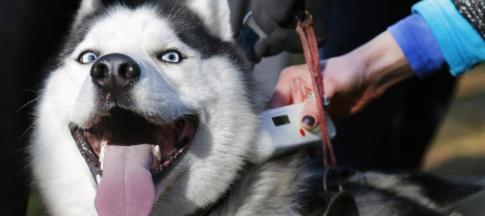
Maybe your furry friend is starting to get on in years, or maybe you’re planning to adopt or rescue a senior dog.
Either way, caring for an older dog comes with a new set of responsibilities and it's important you know how to keep them happy and healthy in later life.
Remember, every dog has different needs. Being proactive and chatting to your vet will help you give your beloved pet the right care for them.
Signs of old age in dogs
There are a few signs your dog is getting old, including:
- greying hair or cloudy eyes – greying hair may be more noticeable in certain breeds and colours, like black dogs
- slowing down and difficulty moving around – this could also be a sign of arthritis
- poor vision or hearing – they may bump into things, or ignore your commands as they haven’t heard them
- incontinence – they may start to have accidents around the house, or just need the toilet more
- getting lumps – these are fatty deposits known as lipomas which aren’t harmful (although you should always check with a vet)
- changes in their appetite, weight and quality of their coat – any of these things could show your dog is getting on in years
- behavioural changes – this could include being irritable, as well as confusion or disorientation
Senior dog behaviour
While a senior dog’s body changes, you may be able to spot changes in their behaviour too.
Some older dogs can start to develop anxiety and irritability in their old age. They might even develop some separation anxiety as they rely on you more than they used to.
It's a good idea to try to keep to a routine, as consistency can calm them and remind them they’re in a safe environment with someone they trust.
On the other hand, some older dogs can begin to show a few signs of aggression, like barking or growling at other dogs.
Often, this comes from conditions like arthritis which can make them feel insecure or vulnerable around other animals.
If your dog shows signs of aggression, check in with the vet as they might have an underlying condition that you could get some treatment to ease their grumpiness!
It’s important to remember a lot of behavioural changes are completely natural, but if your dog shows any significant changes you’re not sure about, always check in with the vet to be safe.
How to feed a senior dog
It’s important you’re feeding your senior dog the right diet to keep them happy and healthy.
As they get older, they will likely lose some of their appetite, may digest and metabolise food differently, and their immune system won’t work as it used to.
It could be a good idea to slowly switch out your regular food for a specialised senior dog food that’s tailored to meet the needs of older dogs.
As some dogs gain weight as they grow older, senior dog foods are usually lower in fat and protein.
Some older dogs also prefer to graze or eat little and often. Keep an eye on your dog’s eating habits and chat to your vet if you have any concerns.
Common health problems in older dogs
There are a few health conditions that become more common as your dog gets older, including:
- arthritis
- blindness
- kidney disease
- dementia or changes in their cognitive function
- diabetes
- cancer
- heart disease
There are many medications and treatments available to help your senior dog as they grow older.
This might be through an adjusted diet, specific medicines or treatments, or a change in their exercise or their home environment.
We know it's not possible to reverse the signs of aging, but there are ways to give your dog a better quality of life.
Exercising your older dog
As your dog gets older, they’re going to slow down – but they still need the right exercise to keep them healthy.
There are a few key things to bear in mind when exercising your dog:
- Go at your dog’s pace – don’t rush them or push them too hard when walking
- Try to stick to familiar routes – as they get older, changes in routine might cause them stress, especially if they’re losing their sight or hearing
- Keep an eye on the weather – older dogs may be more sensitive to extreme cold or heat so try to avoid taking them out during these conditions or consider getting them a coat
- Be aware of other dogs or people – sudden movements or loud noises can be frightening for older dogs, so keep an eye out for anything that might startle them
- Plan ahead – if your dog had any mobility issues, would you be able to get them home or back to the car?
Although they might slow down on their walks, it’s still important you get them out in the fresh air, let them stretch their legs and have a good sniff.
Vet trips for your senior dog
When it comes to senior dog care, it might be the case you’re at the vets more often than you used to be.
Keep an eye on your dog’s eating habits, how they’re doing during exercise, their sleeping patterns and any lumps and bumps.
If you notice anything unusual or concerning, it’s always best to take your dog to the vet right away.
Your vet can recommend any treatment or medicines they may need.
It can be helpful to have dog insurance in place, especially as they get older, to help you out with the cost of vet bills when you need.
Preparing to foster or adopt an older dog
Senior dogs who are looking for a new home might have been through an unsettling or upsetting time. So, it’s all the more important you give them a calm and loving home.
You need to make sure you prepare a few things:
- Get them a comfy bed – they need lots of soft blankets and a safe spot that they know is their own
- Buy the right food – like we said, a senior dog food will give them the right nutrients they need in their old age and be prepared they could be a fussy eater
- Prep your household – if you have any young children in the house, it’s important you let them know they need to be extra gentle and calm with your senior friend
- Know their specific needs – some older dogs might have specific medicines or grooming requirements, like regular ear cleaning so try to find out as much as you can about their past and their needs
Advice from our veterinary specialists
Nicki Fox is a qualified and registered veterinary nurse, RVN CertVNECC APVN (Wildlife). She says about caring for an older dog:
"Watching your pet age can be difficult. It's important to provide routine every day to ensure familiarity. As pets age, their needs change. They become more reliant on their owners, and it is vital to make the necessary changes to their environment to keep them feeling physically and mentally safe."
"Owning an older pet requires patience and understanding. Watch them closely and look for subtle signs such as walking slower on the lead, needing to go outside to toilet more frequently, mobility issues and irritability."
"I would suggest touching base with your vet regularly to ensure you are doing everything you can for your pet. Your vet can advise on the most effective diet, exercise routine and adaptions at home to best suit your aging pet."


